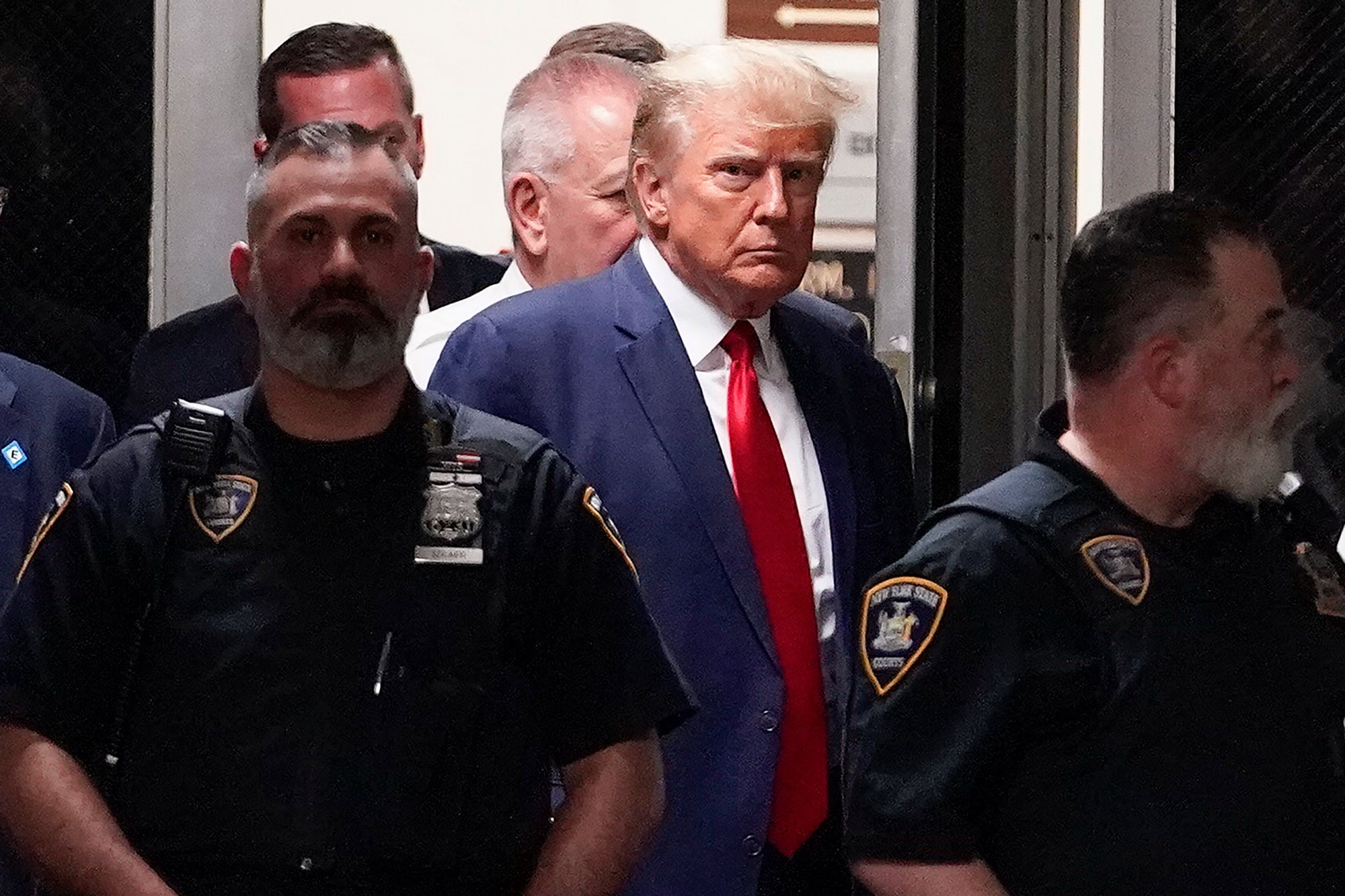The Independent's journalism is supported by our readers. When you purchase through links on our site, we may earn commission.
If we don’t need handcuffs for Donald Trump, do we need them for anyone?
Alvin Bragg is going out of his way to make sure Trump is not photographed or filmed in disrespectful or prejudicial ways

Former president Donald Trump was not handcuffed when he was arrested and arraigned. Nor did he have to take a mugshot.
A Manhattan grand jury indicted Trump on 34 felony counts of falsifying business records. But DA Alvin Bragg went out of his way to make sure Trump was not photographed or filmed in disrespectful or prejudicial ways. There was no perp walk. He wasn’t restrained. There won’t be ugly images all over the newspapers.
This is reasonable; Bragg doesn’t want to inflame Trump’s supporters, and he doesn’t want to give the impression that the trial has been prejudged. Trump is innocent until proven guilty.
If handcuffs and mug shots would prejudice public opinion against Trump, though, what about less famous defendants? Trump organized a dangerous insurrection; he’s made ominous threats of violence against Bragg himself. Yet, the DA felt that handcuffs weren’t needed in this case. Are they really necessary, then, when arresting, say, nonviolent drug offenders, sex workers, or the vast majority of people the police deal with?
Trump is arguably one of the most dangerous people in the country. If it’s safe to arrest him without the usual humiliating arraignment rigmarole, it should be safe to arrest others.
Or, as Democratic strategist Max Burns put it on Twitter, “By bending the rules of arraignment so severely for Trump…we reveal that this process could be made less terrible for *normal people* too.”
In fact, criminal justice reformers have long argued that the arraignment process is unjust, cruel, and in some cases even potentially unconstitutional.
Journalist Diane Dimond, for example, points out that the perp walk—in which the police coordinate with the press to march a suspect in front of cameras—is prejudicial. Media images of someone in police custody lead the public to believe that someone who hasn’t been tried is guilty, violating the Sixth Amendment right to a fair trial. She points out that the perp walk is also effectively a public shaming—which could be seen as violating the Eighth Amendment protection against cruel and unusual punishment.

Suspects are generally handcuffed for the perp walk, which is often obviously unnecessary. In fact, the default handcuffing of suspects in general is debateable. In theory, police are only supposed to use force to counter an imminent threat.
Part of the reason not to cuff Donald Trump is that he could easily be harmed by them, which would cause a massive political scandal. But handcuffs also harm people who aren’t wealthy and powerful. Using them as a default arrest technique is reckless. Again, people who are arrested are presumed innocent; there is no possible justification for casually harming them.
Trump also avoided a mugshot. The main public argument here is that there are many images of him available already, so a mugshot is not needed for identity purposes.
Surely another consideration, though, is that mugshots are humiliating. Mugshot photos are often harshly lit and unflattering. They also signal, like the perp walks, that the person is in police custody, and so suggest that they are guilty.
In the internet age, mugshots can stay online forever, as the Marshall Project warns, and may be used to mock and harass those photographed for years or even decades. For people who aren’t Trump, public mugshots can make it more difficult to get a job or make it difficult to form new friendships.
Like the perp walk, public mugshots are effectively a form of public shaming. The Manhattan DA is guarding Trump’s dignity in order to avoid an outcry. But shouldn’t we care about the dignity of the less powerful as well?

Many commenters have celebrated Trump’s indictment as a triumph of the rule of law. In the United States, even former presidents are subject to the same standards as everyone else.
The arraignment, though, shows that former presidents are treated differently. For them, arrest is a civilized, negotiated affair, rather than an exercise in shame, and violence.
The conclusion here is not that we should subject Trump to unjust and unconstitutional humiliation. Rather, the conclusion is that the criminal justice system should afford everyone the same dignity that it extends to the most powerful.





Join our commenting forum
Join thought-provoking conversations, follow other Independent readers and see their replies